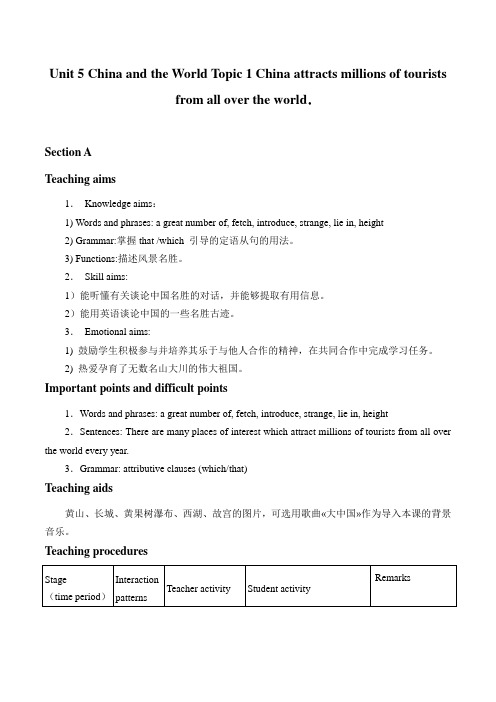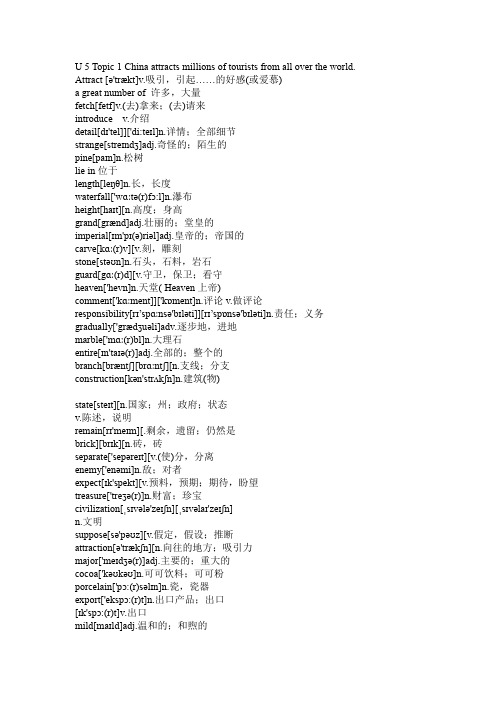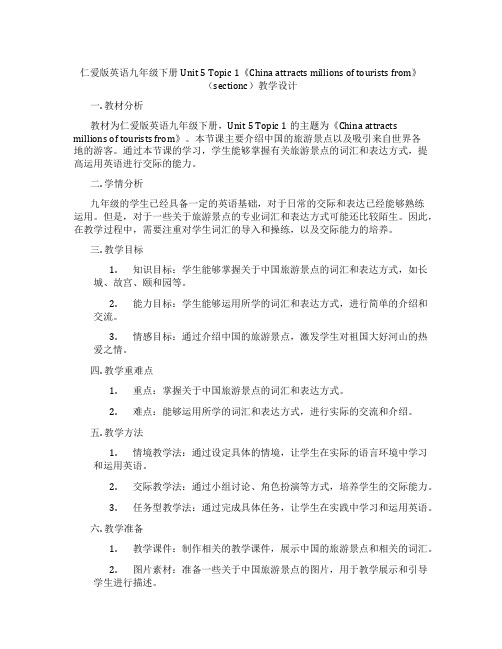初中英语九年级Unit 5Topic 1 China attracts millions of tourists from all over the world. D
九年级英语下册Unit5Topic1Chinaattractsmillionsoftouristsf

Unit 5 Topic 1附:什么样的考试心态最好大部分学生都不敢掉以轻心,因此会出现很多过度焦虑。
想要不出现太强的考试焦虑,那么最好的办法是,形成自己的掌控感。
1、首先,认真研究考试办法。
这一点对知识水平比较高的考生非常重要。
随着重复学习的次数增加,我们对知识的兴奋度会逐渐下降。
最后时刻,再去重复学习,对于很多学生已经意义不大,远不如多花些力气,来思考考试。
很多老师也会讲解考试的办法。
但是,老师给你的办法,不能很好地提高你对考试的掌控感,你要找到自己的一套明确的考试办法,才能最有效地提高你的掌控感。
有了这种掌控感,你不会再觉得,在如此关键性的考试面前,你是一只被检验、被考察甚至被宰割的绵羊。
2、其次,试着从考官的角度思考问题。
考官,是掌控考试的;考生,是被考试考验的。
如果你只把自己当成一个考生,你难免会惶惶不安,因为你觉得自己完全是个被摆布者。
如果从考官的角度去看考试,你就成了一名主动的参与者。
具体的做法就是,面对那些知识点,你想像你是一名考官,并考虑,你该用什么形式来考这个知识点。
高考前两个半月,我用这个办法梳理了一下所有课程,最后起到了匪夷所思的效果,令我在短短两个半月,从全班第19名升到了全班第一名。
当然,这有一个前提——考试范围内的知识点,我基本已完全掌握。
3、考前5天一般是考生心理最为紧张的时刻,因此在这段时间应该注意调整好自己的心态。
在此期间,而直接导致考生在这段时间出现紧张情绪的原因有三个方面:首先,来自于自身。
例如,在临近考试时大量做题会使自己感觉到问题越来越多,造成自我压力过大,心理上不能承受,产生紧张。
加重思想上的负担。
对于全体考生来说,调整心态要重点注意以下四个方面的问题:第一,要调整好复习的方法。
不要耗费时间做大块成套的试题,因为这时候自己掌握的知识就像临近饱和的溶液,不可能会有太多的增加。
应该多做一些提纲挈领的工作,例如查看教材中的重点内容和公式,看读书笔记,翻阅以往的试卷,对前后知识进行穿线;要多熟悉历年考试的题型,要反复看,对这些题做到熟悉掌握,题型会使自己在考前的心情平静下来;应该重点做好知识的查缺补漏,看过去一些大型考试的错题记录,强化对知识进行回顾,找出过去常出现的错误,清楚地知道错在哪里;还应该学会转变思维方法,过去出现的重点错误和一些不应该出现的错误往往是由于思维定式造成的,只有在思维方法上发生转变才能从根本上避免这类错误。
2019年仁爱英语九年级下unit 5 topic1 china attracts millions of tourist.(经典归纳)

Unit 5 Topic1 China attracts millions of tourists from all over the world.1.(去)拿来,(去)取来v.2.石头,石料,岩石n.3.守卫,保护;看守v.4.国家;州;政府;状态n.v.陈述,说明5.剩余,遗留;仍然是v.6. v.(使)分开,分离7. v.预料,预期;期待,盼望8. n.财富,珍宝9. v.假定,假设;推断词汇拓展1.attract v.吸引→ (n.)吸引力2.introduce v.介绍→ (n.)介绍,说明3.detail n.详情,全部细节→ (adj.)详细的4.strange adj.奇怪的,陌生的→ (n.)陌生人5.length n.长,长度→ (adj.)长的6.height n.身高,高度→ (adj.)高的7.enemy n.敌人,反对者→ (pl.)8.include v.包括,包含→ (prep.)包括短语荟萃1.fetch sb. sth.=fetch sth.for sb. 给某人取某物2.introduce sb./sth. to sb.把某人/某物介绍给某人3.in detail详细地4.separate...from...把...和...分开5.expect (sb.) to do sth.期待(某人)做某事6.be supposed to do sth. 应该做某事7.with about 5000 years of history 拥有大约5000年的历史8.place (s)of interest 名胜lions of 数百万10.a great number of 许多11.the number of ...的数量12.the second longest river第二长河13.the birthplace(s) of ...的发源地14.anything else其他的东西15.by oneself单独16.lie in位于...17.be worth doing sth。
仁爱版英语九年级下册:Unit 5 Topic 1. China attracts millions

Unit 5 China and the World Topic 1 China attracts millions of touristsfrom all over the world.Section ATeaching aims1.Knowledge aims:1) Words and phrases: a great number of, fetch, introduce, strange, lie in, height2) Grammar:掌握that /which 引导的定语从句的用法。
3) Functions:描述风景名胜。
2.Skill aims:1)能听懂有关谈论中国名胜的对话,并能够提取有用信息。
2)能用英语谈论中国的一些名胜古迹。
3.Emotional aims:1) 鼓励学生积极参与并培养其乐于与他人合作的精神,在共同合作中完成学习任务。
2) 热爱孕育了无数名山大川的伟大祖国。
Important points and difficult points1.Words and phrases: a great number of, fetch, introduce, strange, lie in, height2.Sentences: There are many places of interest which attract millions of tourists from all over the world every year.3.Grammar: attributive clauses (which/that)Teaching aids黄山、长城、黄果树瀑布、西湖、故宫的图片,可选用歌曲«大中国»作为导入本课的背景音乐。
Teaching proceduresBlackboard designSection BTeaching aims1.Knowledge aims:1) Words and phrases: stone, guard, It’s said that…, a symbol of, play an important part in …2) Grammar:进一步掌握that /which 引导的定语从句的用法。
仁爱英语九下单词表完整版

U 5 Topic 1 China attracts millions of tourists from all over the world. Attract [ə'trækt]v.吸引,引起……的好感(或爱慕)a great number of 许多,大量fetch[fetf]v.(去)拿来;(去)请来introduce v.介绍detail[dɪ'tel]]['di:teɪl]n.详情;全部细节strange[streɪndʒ]adj.奇怪的;陌生的pine[paɪn]n.松树lie in位于length[leŋθ]n.长,长度waterfall['wɑːtə(r)fɔ:l]n.瀑布height[haɪt][n.高度;身高grand[grænd]adj.壮丽的;堂皇的imperial[ɪm'pɪ(ə)riəl]adj.皇帝的;帝国的carve[kɑː(r)v][v.刻,雕刻stone[stəʊn]n.石头,石料,岩石guard[gɑː(r)d][v.守卫,保卫;看守heaven['hevn]n.天堂( Heaven上帝)comment['kɑːment]]['kɒment]n.评论v.做评论responsibility[rɪ’spɑːnsə'bɪləti]][rɪ’spɒnsə'bɪləti]n.责任;义务gradually['grædʒuəli]adv.逐步地,进地marble['mɑː(r)bl]n.大理石entire[ɪn'taɪə(r)]adj.全部的;整个的branch[bræntʃ][brɑːntʃ][n.支线;分支construction[kən'strʌkʃn]n.建筑(物)state[steɪt][n.国家;州;政府;状态v.陈述,说明remain[rɪ'meɪm][.剩余,遗留;仍然是brick][brɪk][n.砖,砖separate['sepəreɪt][v.(使)分,分离enemy['enəmi]n.敌;对者expect[ɪk'spekt][v.预料,预期;期待,盼望treasure['treʒə(r)]n.财富;珍宝civilization[ˌsɪvələ'zeɪʃn][ˌsɪvəlaɪ'zeɪʃn]n.文明suppose[sə'pəʊz][v.假定,假设;推断attraction[ə'trækʃn][n.向往的地方;吸引力major['meɪdʒə(r)]adj.主要的;重大的cocoa['kəʊkəʊ]n.可可饮料;可可粉porcelain['pɔ:(r)səlɪn]n.瓷,瓷器export['ekspɔ:(r)t]n.出口产品;出口[ɪk'spɔ:(r)t]v.出口mild[maɪld]adj.温和的;和煦的unique[ju'ni:k]adj.独一无二的;独特的include][ɪn'klu:d][v.包含,包括topic['tɑːpɪk]['tɒprk][n.话题,题world-famous adj.举世闻名的firewood['faɪə(r)wʊd]n.木柴sauce[sɔ:s]n.酱;调味汁vinegar['vɪnɪgə(r)]n.醋Topic 2 He is really the pride of Chinapioneer[ˌpaɪə'nɪr][ˌpaɪə'nɪə(r)]n.拓荒者B.C.[ˌbi: 'si:]abbr.公元前thinker['θɪŋkə(r)]n.思想家wise[waɪz]adj.明智的,高明的kindness['kaɪndnəs]n.仁慈,善良philosopher[fə'lɑːsəfə(r)];[fə'lɒsəfə(r)n.哲学家;深思的人influence['ɪnfluəns]v.&n.影响whom[hu:m]pron.谁,什么人pass away 去世;消失unite[ju'naɪt]v.统一;联合,团结defeat[dɪ'fi:t]v.击败,战胜set up 建立,创建;设置empire['empaɪə(r)]n.帝国forever[fər'evə(r)]adv.永远;长久地come to an end 结束captain['kæptɪn]n.船长,机长;(海军)上校lead[li:d]v.率领,领导;引领compass['kʌmpəs]n.指南针,罗盘;圆规sailing['seɪlɪŋ]n.航行sail[seɪl]v.航行;起航coast[kəʊst]n.海岸;海滨unfortunately[ʌn'fɔ:(r)tʃənətli]adv.不幸地birth[bɜː(r)θ][n.出生trade[treɪd]n.贸易,买卖,交易v.互相交换,以物易物missile['mɪsl]['mɪsaɪl]n.导弹graduation[grædʒu'eɪʃn]n.毕业university[ˌju:nɪ'vɜː(r)səti]n.大学Pacific[pə'sɪfɪk]Ocean 太平洋further['fɜː(r)ðə(r)]adj.进一步的degree[dɪ'gri:]n.(大学)学位;度aerospace['eərəʊspeɪs]n.航空航天工业graduate['grædʒueɪt] v.毕业['grædʒuət] n.毕业生researcher['ri:sɜːtʃə]][rɪ'sɜːtʃə]n.研究theory['θɪri]]['θɪəri]n.理论;原理motherland['mʌðə(r)lænd]n.祖国blank[blæŋk]n.空白;空白处,空格institute['ɪnstɪtu:t];['ɪnstɪtju:t]n.机构charge[tʃɑː(r)dʒ]n.主管;掌管v.要价;收费in charge of 主管;掌管;负责spacecraft['speɪskræft[;['speɪskrɑːft] n.宇宙飞船related[rɪ'leɪtɪd]adj.相关的,有联系的youth[ju:θ]n.青年,年轻人devotion[dɪ'vəʊʃn]n.关爱;奉献;忠诚express[ɪk'spres]v.表达;表露career[kə'rɪr]][kə'rɪə(r)]n.事业;职业destination[ˌdestɪ'neɪʃn]n.目的地;终点hybrid['haɪbrɪd]rice 杂交水稻gunpowder['gʌnpaʊdə(r)]n.火药printing['prɪntɪŋ]n.印刷;印刷术sailor['seɪlə(r)]n.水手,海员discovery[dɪ'skʌvəri]n.发现firework['faɪə(r)wɜː(r)k]n.烟花;焰火Arab['ærəb]n.阿拉伯人adj.阿拉伯的,阿拉伯人的eastern['i:stə(r)n]adj.东方的,东部的bark[bɑː(r)k]n.树皮;狗叫声v.狗叫rag[ræg]n.破布,抹布clay[kleɪ]n.黏土ink[iŋk][n.墨水,油墨Topic 3 Now it is a symbol of England. hang[hæŋ][v.悬挂,吊description[dɪ'skrɪpʃn]n.形容;说明Australian[ɒ'streɪliən]n.澳大利亚人below[bɪ'ləʊ]adv.&prep.在……下面harbor['hɑː(r)bə(r)][n.港口,港湾leader['li:də(r)[ n.领导者,领袖exhibition[ˌeksɪ'bɪʃn]n.展览;展出lean[li:n]v.倾斜private['praɪvət]adj.私人的;私有的president['prezɪdənt][n.总统,国家主席ring out 发出清脆的响声radium['reɪdiəm]n.镭prize[praɪz]n.奖、奖励,奖品=lifetime['laɪftaɪm]n.一生,有生之年telegraph['telɪgræf]['teligrɑːf]n.电报photographic[ˌfəʊtə'græfɪk]adj.摄影的duty['du:ti]]['dju:ti]n.责任,义务;职责neither['ni:ðə(r);'naɪðə(r)]pron.两者都不adv.也不nor[nɔ:(r)]conj.也不neither ..nor ... 既不……也不……remarry[ˌri:'mæri]v.再婚stepmother['stepmʌðə(r)[ n.继母license['laɪsns]n.许可证,执照lawyer['lɔ:jə(r)]n.律师trust[trʌst]v.&n.信任,信赖,相信highly['haɪli]adu.很,非常politician[ˌpɑːlə'tɪʃn][ˌpɒlə'tɪʃn]n.从政政治家elect[ɪ'lekt] v.选举;推选Civil['sɪvl]War 内战break out 爆发union['ju:niən]n.联邦;协会slave[sleɪv]n.奴隶get rid[rɪd]of 丢弃,摆脱,扔掉set free 释放;解放shoot[ ʃu:t]v.开(枪或其他武器),射击break up 拆开,解散;粉碎unit['ju:nɪt]n.单元;单位walker['wɔ:kə(r)] n.步行者backwards['bækwə(r)dz]adv.向后;朝反方向concern[kən'sɜː(r)n]n.担心,忧虑v.与……有关;让(某人)担忧content[kən'tent]adj. 满意的,满足的]['kɑːntent]]['kɒntent[ n.内容failure['feɪljə(r)]n.失败brief[bri:f]adj.简单的;短暂的achievement[ə'tʃi:vmənt]n.功绩,成就Egyptian[i'dʒɪpʃn]adj.埃及的;埃及人的n.埃及人(语)pyramid['pɪrəmɪd]n.(古埃及的)金字塔tomb[tu:m]n.坟墓;冢complete[kəm'pli:t]v.结束,完成adj.完整的;彻底的A.D.[ˌeɪ'di:]abbr.公元scientific[ˌsaɪən'tɪfɪk]adj.科学的;关于科学的ton[tʌn]n.吨fix[fɪks]v.安装;修理tool[tu:l]n.工具mystery['mɪstri]n.不可理解的事;奥秘completion[kəm'pli:ʃn]n.完成;竣工Review of Unit 5graze[greɪz]v.放牧;吃青草make fun of 嘲弄,取笑,拿……开玩笑wolf[wʊlf]n.狼iron['aɪə(r)n]adj.坚强的;强硬坚定的glory['glɔ:ri]n.荣誉,光荣;赞美peasant['peznt]n.农民battle['bætl]n.战斗,战役battlefield['bætlfi:ld]n.战场memory['meməri]n.记忆力,记性;回忆ওin memory of 纪念romantic[rəʊ'mæntɪk]adj.浪漫的;空想的(tale[teɪl]n.故事home and abroad 国内外scenery['si:nəri]n.风景;景色Unit 6Topic 1 I would rather watch sports shows than those ones. would rather... than... 宁愿,更喜欢actress['æktrəs]n.女演员charming['tʃɑː(r)miŋ]adj.令人着迷的迷人的;吸引人的educational[ˌedʒu'keɪʃənl]adj.(有关)教育的science fiction['fɪkʃn][科幻小说tragedy['trædʒədi]n.悲剧;悲剧作品documentary[dɑːkju'mentri][dɒkju'mentri]n.纪录片comedy['kɑːmədi][:]['kɒmədi][n. 喜剧;喜剧片ending['endiŋ]n.结尾,结局drawing['drɔ:iŋ]n.绘画;图画mission['mɪʃn]n.使命,天职;军事行动adventure[əd'ventʃə(r)]n.冒险;冒险经历;奇遇mysterious[mɪ'stɪriəs][mɪ'stɪəriəs]adj.神秘的crew[kru:]n.(轮船、飞机等上面的)全体工作人员rescue['reskju:]v.&n.援救,营救award[ə'wɔ:(r)d]n.奖;奖品;奖金ceremony['serəməni]n.典礼;仪式motion['məʊʃn]n.运动;移动director[də'rektə(r);dɪ'rektə(r)]n.导演general['dʒenrəl]adj.大体的;普遍的footstep['fʊtstep]n.足迹talented['tæləntɪd]adj.有才能的;天才的take up 继续;占据(时间、位置等)coach[kəutʃ]n.教练formally['fɔ:(r)məli]adv.正式地;正规地rather than 而不是organize['ɔ:(r)gənaɪz]v.组织,筹备aim[eɪm]n.目的,目标advance[əd'væns]][əd'vɑːns]v.&n.发展,进步as is known to all 众所周知therefore['ðerfɔ:(r)];['ðeafɔ:(r)]adv.因此,所以violence['vaɪələns]n.暴力,暴行violent['vaɪələnt]adj.暴力的,强暴的Topic 2 Who is your favorite character in literature?literature['Iɪtrətʃə(r)[ n.文学;文学作品classic['klæsɪk]adj.最优秀的;典型的in one's view[vju:]在某人看来overcome[ˌəʊvə(r) 'kʌm]v.克服;解决statement['steɪtmənt]n.说法;陈述literary['Iɪtəreri]['Iɪtərəri]adj.文学的society[sə'saɪəti]n.社团,协会;社会moving['mu:viŋ]adj.感人的,动人的poetry['pəʊətri]n.诗集;诗歌poet['pəʊɪt[ n.诗人playwright['pleɪraɪt] n.剧作家drama['drɑːmə]n.戏剧scene[si:n][n.场面,片断kiss[kɪs]v.&n.吻,亲吻masterpiece['mæstərpi:s]['mɑːstəpi:s]n.代表作,杰作district['dɪstrɪkt]n.地区;区域unlike[ˌʌn'laɪk]prep.不像;与……不同adj.不同的,不像的rainbow['reɪnbəʊ]n.虹,彩虹inspiration[inspə'reɪʃn]n.灵感;妙计eventually[ɪ'ventʃuəli]adv.最后,终于golden['gəʊldən]adj.金(黄)色的monk[mʌŋk]n.僧侣;修道士narrator[nə'reɪtə(r)]n.叙述者;旁白员husband['hʌzbənd]n.丈夫precious['preʃəs]adj.宝贵的;珍稀的possession[pə'zeʃn]n.个人财产;拥有wealth[welθ]n.财产,财富chain[tʃeɪn]n.链子;一系列;连锁商店sudden['sʌdn]adj.突然的,忽然的all of a sudden 突然,猛地cut off 剪掉;切断(水源、电源等)live through 经历(灾难或其它困境)而幸存possibly['pɑːsəbli]['pɒsəbli]adv.可能,或许comb[kəʊm]n.梳子v.梳理(头发)jeweled['dʒu:əld]adj.镶有宝石的rim[rɪm]n.(圆形物体的)边沿;轮圈long for 渴望(尤指对看似不会很快发生的事)hunt[hʌnt]v.搜寻;打猎;追捕at present 目前couple['kʌpl]n.两人;一对the couple (尤指)夫妻,情侣Topic 3 I will remember our friendship forever.first of all首先exchange[ɪks'tfeɪndʒ]v.&n.交换;交流chalk[tʃɔ:k][n.粉笔dozen['dʌzn]n.十二个,一打dozens of 很多,许多excellence['eksələns][n.优秀,卓越valuable['væljuəbl][adj.很有价值的;很值钱的bottom['bɑːtəm]['bɒtəm][n.底,底部adj.底部的;最后的,尽头的unforgettable[ʌnfə(r)'getəbl]adj.难以忘怀的;令人难忘的joy[dʒɔɪ][n.高兴,愉快,喜悦royal['rɔɪəl]adj.女王的,王室的recall[rɪ'kɔ:l][v.回忆起;记起n.记忆力,记性competition[kɑːmpə'tɪʃn]][kɒp'tɪʃn]n.比赛,竞赛custom['kʌstəm][n.风俗,习俗;习性principal['prɪnsəpl][n.大学校长adj.首要的,主要的diploma[dɪ'pləʊmə][n.毕业文凭congratulate[kən'grætʃuleɪt][v.祝贺possibility[ˌpɑːsə'bɪləti];[ˌpɒsə'bɪləti]n.机会,契机;可能(性)thankful['θæŋkfl]adj.感谢的,感激的in a hurryhug][hʌg]v.&n.拥抱;搂抱in time时,来得promise['prɑːmɪs]['promɪs]v.&n.许诺,保证conclude[kən'klu:d]v.推断出;(使)结束Review of Units 5-6pound[paʊnd]n.英磅absent['æbsənt]adj.缺席的,不在场的alive[ə'laɪv]adj.活着的,在世的sharply['ʃɑː(r)pli]adv.急剧地;猛烈地asleep[ə'sli:p]adj.睡着的awake[ə'weɪk]adj.醒着的ant[ænt]n.蚂蚁hard-working adj.工作努力的,辛勤的unless[ənles]coni.除非;除非在...情况下truth[tru:θ]n.真相;实情;事实operate['ɑːpəreɪt[;]['ɒpəreɪt]v.操作;工作instruction[in'strʌkʃn]n.用法说明;操作指南northwestern[ˌnɔ:(r)θ'westə(r)n]adj.西北的,西北方向的flow[fləʊ]v.流,流动appearance[ə'pɪrəns][ə'pɪərəns]n.出起源;外观muddy['mʌdi]adj.多泥的;浑浊的idiom['ɪdiəm]n.习语,成语argument['ɑː(r)gjumənt]n.争吵;争论slap[slæp]v.&n.(用手掌)打,拍,掴till[til]prep.&conj.直到……为止mud[mʌd]n.泥,泥浆sink[sɪŋk]v.下沉reply[rɪ'plɪ]v.&n.回答;回应erase[ɪ'reɪs]][ɪ'reɪz]v.擦掉,抹去response[rɪ'spɑːns][rɪ'spɒns]n.反应;回答。
仁爱英语九年级下册unit5topic1语言词汇知识点解析,知识点讲解

仁爱九年级Unit 5 China and the WorldTopic 1 China attracts millions of tourists from all over the world一.重要词汇1.重点词汇和短语:attract吸引,引起birthplace发源地,出生地fetch去取来,去带来introduce介绍detail详细strange奇怪有,陌生的pine松树length长,长度waterfall瀑布height高度,身高introduce 介绍,把...介绍给strange(adj)奇怪的height(n)高度,身高stone 石头,石料guard(V)保卫、守护、看守, treasure 宝藏、珍宝state 国家、洲remain 遗留、剩余, separate 分开,隔开, enemy 敌军, expect 期望,预料suppose 假定,猜想,认为, a great number of大量,许多in detail 相信地lie in 位于play an important part in 发挥重要作用扮演重要角色wear away磨损,消逝, separate...from使...和...分离, regard as 当作be famous for 因为...而出名along with...和..一起二.语法that/which 引导的定语从句。
三.重点句型及交际用语:1. China is a great country that has about 5000 years of history.2. There are many places of interest which attract millions of tourists from all over the world every year.3. There are a great number of rivers in China.4. I can fetch you Guide to China.5. It’s a book which introduces China in detail.6. It lies in Anhui Province.7. It’s a place w hich /that is worth visiting.8. It also plays an important part in Chinese festivals.9. The Great Wall is a treasure of Chinese civilization and it is regarded as a symbol of the Chinese nation.10. What is it famous for?任务型学习目标1.掌握that/which 引导的定语从句;2.会正确描述名山大川等名胜,并会表达赞同;3.了解我国的名山大川,风景名胜,雄伟建筑和悠久文化,增强学生的爱国之情;4.学会把含有定语从句的复合句变成两个简单句,以便于更容易地理解那些较长复合句的意思。
仁爱版英语九年级下册Unit 5 Topic 1《China attracts millions o

仁爱版英语九年级下册Unit 5 Topic 1《China attracts millions of tourists from》(sectionb)教学设计一. 教材分析本课选自仁爱版英语九年级下册Unit 5 Topic 1《China attracts millions of tourists from》(sectionb),主要讲述了中国吸引着来自世界各地的游客,以及中国的旅游景点。
本课内容旨在让学生掌握一般现在时的被动语态,学会用英语描述中国的旅游景点和吸引游客的原因。
教材内容丰富,插图生动,有助于激发学生的学习兴趣。
二. 学情分析九年级的学生已经掌握了英语学习的基本语法和词汇,具备一定的听说读写能力。
但部分学生对一般现在时的被动语态掌握不够扎实,需要在教学中加以巩固。
此外,学生对中国的旅游景点了解不多,需要在课前进行相关文化背景的介绍。
三. 教学目标1.知识目标:–掌握一般现在时的被动语态结构:am/is/are done;–学会描述中国的旅游景点和吸引游客的原因。
2.能力目标:–能用英语进行简单的交流,描述中国的旅游景点和吸引游客的原因;–提高学生的团队合作能力和表达能力。
3.情感目标:–培养学生对祖国的热爱之情;–增强学生对英语学习的兴趣。
四. 教学重难点•一般现在时的被动语态结构;•描述中国的旅游景点和吸引游客的原因。
•一般现在时的被动语态的运用;•如何在实际情景中运用所学知识。
五. 教学方法1.情境教学法:通过设定真实情境,让学生在实际环境中运用英语;2.交际法:引导学生进行小组讨论,提高学生的口语表达能力;3.任务型教学法:通过完成具体任务,让学生在实践中学习英语;4.文化背景介绍:介绍中国的旅游景点,帮助学生更好地理解课文内容。
六. 教学准备1.教师准备:–提前了解学生的学习情况,针对性地进行教学设计;–准备相关的教学材料和课件;–布置课前预习任务,让学生了解中国的旅游景点。
仁爱版英语九年级下册Unit 5 Topic 1《China attracts millions o

仁爱版英语九年级下册Unit 5 Topic 1《China attracts millions of tourists from》(sectionc)教学设计一. 教材分析教材为仁爱版英语九年级下册,Unit 5 Topic 1的主题为《China attracts millions of tourists from》。
本节课主要介绍中国的旅游景点以及吸引来自世界各地的游客。
通过本节课的学习,学生能够掌握有关旅游景点的词汇和表达方式,提高运用英语进行交际的能力。
二. 学情分析九年级的学生已经具备一定的英语基础,对于日常的交际和表达已经能够熟练运用。
但是,对于一些关于旅游景点的专业词汇和表达方式可能还比较陌生。
因此,在教学过程中,需要注重对学生词汇的导入和操练,以及交际能力的培养。
三. 教学目标1.知识目标:学生能够掌握关于中国旅游景点的词汇和表达方式,如长城、故宫、颐和园等。
2.能力目标:学生能够运用所学的词汇和表达方式,进行简单的介绍和交流。
3.情感目标:通过介绍中国的旅游景点,激发学生对祖国大好河山的热爱之情。
四. 教学重难点1.重点:掌握关于中国旅游景点的词汇和表达方式。
2.难点:能够运用所学的词汇和表达方式,进行实际的交流和介绍。
五. 教学方法1.情境教学法:通过设定具体的情境,让学生在实际的语言环境中学习和运用英语。
2.交际教学法:通过小组讨论、角色扮演等方式,培养学生的交际能力。
3.任务型教学法:通过完成具体任务,让学生在实践中学习和运用英语。
六. 教学准备1.教学课件:制作相关的教学课件,展示中国的旅游景点和相关的词汇。
2.图片素材:准备一些关于中国旅游景点的图片,用于教学展示和引导学生进行描述。
3.录音设备:准备录音设备,用于播放相关的语音材料。
七. 教学过程1.导入(5分钟)通过播放一段关于中国旅游景点的短片,激发学生的学习兴趣,并引入本节课的主题。
2.呈现(10分钟)教师通过课件和图片,展示一些关于中国旅游景点的词汇和表达方式,如长城、故宫、颐和园等,并进行简单的解释和介绍。
九年级英语下册Unit5ChinaandtheWorldTopic1Chinaattractsmil

1b Listen to 1a and choose the correct answer. Susanna, Jane and Kangkang are mainly talking about ___. A.the Palace Museum B.dragons and colors C.emperors D.dragons, a symbol of the Chinese nation
Mount Huang/strange pine trees/Anhui Province
A: Do you know …? B: Yes. It’s a …with ... A: Where is it? B: It lies in ... A: It’s a place which/that is worth visiting. B: Yes, let’s go there this summer vacation.
•
•
2a Complete the following sentences with the correct
attributive clauses based on 1a.
( ) 1. Jane and Kangkang are showing Susanna around the buildings__________. ( ) 2. Jane thinks yellow is the color __________. ( ) 3. It is said that dragons are powerful animals _________. ( ) 4. It is said that emperors are persons __________. ( ) 5. Chinese people think a dragon is an animal _________. ( ) 6. We all know that dragons are the animals __________. A. which/that play an important part in Chinese festivals B. which/that guard the whole nation C. which/that have yellow roofs D. which/that is a symbol of the Chinese nation E. which/that is a symbol of imperial power in ancient China F. who/that are the sons of Heaven
仁爱版英语九年级下册Unit5 Topic1 China attracts millions of tourists from

初中英语学习材料madeofjingetiejiUnit5 Topic1 China attracts millions of tourists fromall over the worldSection A学校班级学生完成时间:(30分钟以内)一.基础训练:Ⅰ.根据句意及首字母提示完成句子。
1. The teacher let us i ourselves to others when we met the first time.2. —Do you know the h of Yao Ming?—Of course. He is 2.26 meters tall.3. The interesting cartoon book a______________ millions of children all over the world.4. I’m very thirty. Could you go an d f__________ me a bottle of water?5. Meizhou Island is very beautiful. A lot of t____________ visit it every year.Ⅱ.用所给词的适当形式填空。
1. The Yangzi River is the third ____________ (long) river in the world.2. Lily wears a coat that ___________ (cost) 200 yuan.3. She has many hobbies, such as ___________ (play) the piano and ________ (make) paper flower.4. The book is very useful. It’s worth ____________ (read).5. The Great Wall is more than 6000 li in ________(long).二.课时达标:Ⅰ.选择题( )1.—China is a great country with 5,000 years history.—Yes, it’s three years I went to China last time. I want to go there again.A.in; sinceB.of; sinceC.of; until( )2.The number of people invited ______ fifty, but a number of them ______ absent(缺席) for different reasons.A.were; wereB.was; wasC.was; were( )3.—Have you read the poems ______ are written by Du Fu?—Of course, many of them.A. thatB.whoC.what( )4.Taiwan lies ______ the southeast of China. It’s a great place that is worth ________.A. in; visitingB.to; visitingC. in; to visiting( )5.This is the most interesting book ______ I have ever read.A.whatB.whichC.that( )6.He lived in a small village, ______ was far from the railway station.A. thatB. whichC. where( )7.I like the second football match _______ was held last week.A. whichB. /C. that( )8.People that lived in the mountains didn’t have wells in the past, so they had to ______ water from a stream far away.A.bringB.fetchC.takeⅡ.根据语境,用恰当的句子完成对话。
Unit5 Topic1 China attracts millions of tourists

初三下Unit5Topic1英语导学案Section CI.学习目标1.继续学习用that和which引导的定语从句;2.了解更多中国的地理知识—香港、澳门、台湾和不同风格的民居。
II.课前预习在文中找到并划出下面的短语1.吸引很多游客_______________________________2.回到祖国的怀抱_____________________________3.serve as a bridge______________________________4.把…与…连接在一起_________________________5.世界的其它地区_____________________________6.作为…而著名_______________7.想起__________8.the pearl of the Orient__________________________9.Shopping Heaven______________________________10.赌场_________________11.赌城________________12.把…看作/认为…是___________________________13.进行参观______________________________14.the Treasure Island of China ____________________15.various delicious fruits16.我们伟大祖国的重要组成部分__________________________________________17.一个令人惊讶的建筑__________________________18.泥土制成的__________________________________19.世界上独一无二的____________________________20.抵御大风21.dig into a hillsideIII.导学过程1.视频引入讨论Hong Kong和Macao的话题,学习一些风景名胜。
- 1、下载文档前请自行甄别文档内容的完整性,平台不提供额外的编辑、内容补充、找答案等附加服务。
- 2、"仅部分预览"的文档,不可在线预览部分如存在完整性等问题,可反馈申请退款(可完整预览的文档不适用该条件!)。
- 3、如文档侵犯您的权益,请联系客服反馈,我们会尽快为您处理(人工客服工作时间:9:00-18:30)。
to Beijing.
Bye-bye!
1. Are there many differences between the north and the south? Yes, there are.
2. What do people often wear to do outdoor activities in the north? Thick coats and gloves.
③ TThheeccoommppuutteerrw(tahsast/owldhoicuht). I wanted to buy wthaastsold out. computer. That is the Yellow River that/which is the birthplace
④ TohfaCthisintehseeYceullotuwreR.iver. The Yellow River is the
2. Describe each place, using as many attributive clauses as possible.
3. Choose the place you like best, and then collect some pictures and information to make a booklet
g
b
a
f
dc
e
1. Master some new words and phrases.
2. Review attributive clauses which use “that” and “which”.
3. Go on learning about the geography of China.
3b
Useful expressions (录音3)
They are well worth visiting. If not, you must find a chance to go there! It seemed that we experienced four seasons in a day. The scenery is so attractive that visitors often lose themselves in it. Taiwan is considered the Treasure Island of China.
In Picture 1, it’s a plain. In Picture 2, they’re hills.
The wheat is in the north, but the rice is in the south of China.
fpfrleoaeuinzre
Listen and answer the questions.(录音1)
travel by land and by water
Retell 1a according to the key words.
PC=pderrivsiongngiarlaicffeoenmspeuter
3a
Grammar focus (录音2)
Attributive clauses (Ⅰ)
4. Talk about the life in the south
Join the sentences with that/which to form attributive clauses. (1) This is the house. We lived in the house last
year. (2) This is the best movie. I saw the best movie
bc. that you bought last month
4. A giraffe is a kind of animal ___. d. which was taken away by the police is mine
Connect these sentences using “which” or “that”.
Feature Part
Weather in winter
Food
Transportation
the north
rather cold, snow heavily
food made with come and go
wheat flour
by land
the south
mild and wet
rice
Unit 5 Topic 1 How much do you know
about China? Section D
T: We all know West Lake is in Hangzhou. But where is Hangzhou?
S1: It is ห้องสมุดไป่ตู้n the south of China. T: Good. But where is Beijing? S2: It is in the north of China. T: Good. Let’s have a discussion.
What are the differences between the south and the north of China?
It’s very cold in the north of China. Snow is here and there. But it’s hot in Picture 2. It’s green all the year round.
3. WRhicaet.is the main food of southern people?
4. HNoowt doonlpyeboyplaenidn bthuet asolsuothbytrwavaetel?r.
1a
Read and understand (影片1)
Read 1a again and fill out the table.
① This is the photo. You took the photo last summer. This is the photo (that/which) you took last summer.
② The building is a supermarket. The building stands near tThheetrbauinildsitnagtiothna. t/which stands near the train station is a supermarket.
China is a great country that/which has about 5 000 years of history. It’s a book that/which introduces China in detail. Could you tell me something about the places (that/which) you visited there? That’s the most fantastic place (that) I have ever
Match the two columns to make complete sentences.
1. The car __a_.
c
2. May I use the PC ____?
d
3. The driving license ____.
a. which I rented broke down b. which has a very long neck
Project
1. Suppose you travel around China. Mark the following places on the map. a. Mount Tai b. Mount Hua c. Hong Kong d. Macao e. Taiwan f. West Lake g. Tibet
